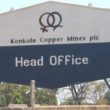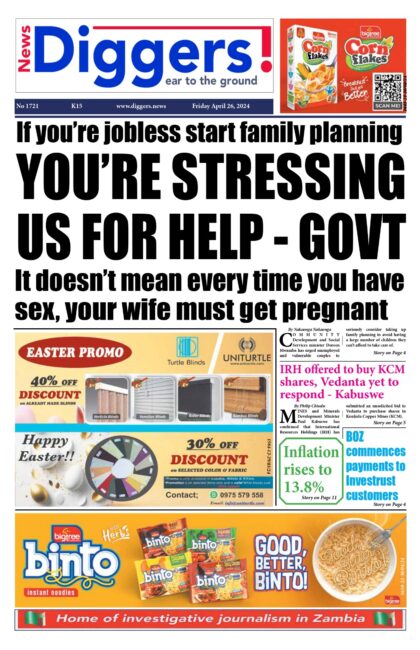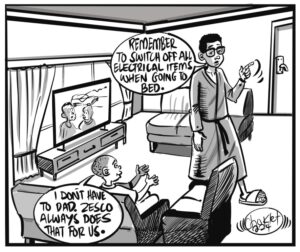Zambia has stoked fears among businesses about the rule of law after the government oversaw the placement of a mining operation operated by India’s Vedanta into administration with plans to sell it.
Last week Vedanta launched a fightback in a South African court as it seeks an international injunction on the liquidation and possible sale of Konkola Copper Mines, one of Zambia’s biggest producers.
The case is being closely watched by international investors in the once-thriving African democracy that has fallen on hard times since President Edgar Lungu took power in 2015.
Vedanta said it lost control of the unit, which it valued at $1.6bn, in “an unfair and unjust process” in May. Zambia’s state mining investment group, KCM’s minority shareholder, placed it in winding-up proceedings without warning Vedanta.
Zambia’s government has said that the liquidation is lawful and that it is intended to replace KCM’s owner.
The saga could also expose Beijing’s extensive ties to the southern African nation, with a Chinese government-owned company said to be among bidders seeking to take over KCM. Mr Lungu has promised a quick sale after a liquidation that investors claim he ordered.
It followed an angry call by Mr Lungu for a “divorce” from private international mining companies after they complained that steep taxes imposed by his cash-strapped government had stifled production.
“They are liars, they are cheats and they take us for fools . . . those who are uncomfortable to stay in our house can go out,” the president said as he accused miners of breaking promises to invest.
Critics claim Edgar Lungu, who has been in power since 2015, is growing more authoritarian © AFP
Mr Lungu was channelling widespread frustration. Vedanta has been criticised in Zambia over an alleged failure to pay suppliers to KCM, a high-cost “wet” mine that must pump out the equivalent of 140 swimming pools every day to dig out the copper.
“Vedanta was a sitting duck. They were very unpopular,” said one industry observer who declined to be named given the political sensitivities of the case.
The Indian miner said that it had met investment goals for the mine, such as injecting $3bn since its acquisition in 2004. “Working capital constraints did mean the company extended payment terms” as taxes and costs increased, it added.
Yet Zambians who want Vedanta gone distrust the motives of Mr Lungu and his ruling Patriotic Front.
“It is the right thing to do but they are not the right people to do it,” said Fumba Chama, a musician who, under the name Pilato, has criticised government corruption in his lyrics.
Since Mr Lungu consolidated his power in a disputed 2016 election, he has grown increasingly authoritarian. He has clamped down on critical independent media and civil society and embraced Chinese loans to pay for infrastructure. That borrowing boom is now foundering.
Economic growth this year is expected to be at its slowest in two decades and Zambia’s debt, which has doubled to $10bn in the past decade, is edging close to default. The country exemplifies fears that a Chinese “debt trap” on the continent will lead to Beijing scooping up assets on the cheap.
Echoing these concerns, in June Zambia’s main opposition warned in a statement that KCM’s sale would be a “covert” and unlawful takeover of Zambian assets “through the backdoor”.
Mr Chama, who has himself faced censorship and state harassment, believes that Mr Lungu backed “divorce” after his party was rattled by a recent by-election loss in the party’s power base, which happens to be Zambia’s copper belt in which KCM is based. “It is a political decision, not a business or an economic one,” he said.
A spokesperson for Mr Lungu denied that the president wielded any influence over the liquidation, which Zambia’s government insisted was lawful.
At the start of this decade Zambia was regarded as a stable home for mining investment compared with neighbours Zimbabwe and the Democratic Republic of Congo.
Privatisation of mines that were nationalised in the 1970s, including KCM, led to an expansion in copper production that almost trebled Zambia’s gross domestic product between 2000 and 2017.
Vedanta, which will oppose any sale of KCM and is preparing for international arbitration over its fate, recently commissioned a study by Eunomix, the research firm. The study carried a pointed warning about the danger of reversing Zambia’s hard-won, investment-friendly reputation.
Recommended
The Commodities Note
Zambia lured by the siren song of resource nationalism
According to Eunomix, Zambia and Chile produced a tenth each of the world’s copper in 1970. By 2017, Zambia’s share had fallen to 4 per cent due to the legacy of the nationalisation while Chile controlled more than a quarter of world production.
Despite tensions with other operators such as Glencore and First Quantum, analysts said it was unlikely that there would be wider nationalisation because the government did not want to put at risk thousands of jobs ahead of Mr Lungu’s 2021 re-election bid.
The populist appeal of seizing just KCM may fade even sooner.
“What they did is not good. Not everything belongs to the government,” said Maureen Mumba, 34, a trader in the main market of Lusaka. She has expropriation problems of her own: political goons seize her goods.
While talking to Ms Mumba, stony-faced young men appeared to escort the Financial Times away from the market. They were “cadres” of Mr Lungu’s ruling party, operating as informal secret police.
Even street traders have to toe the political line.












